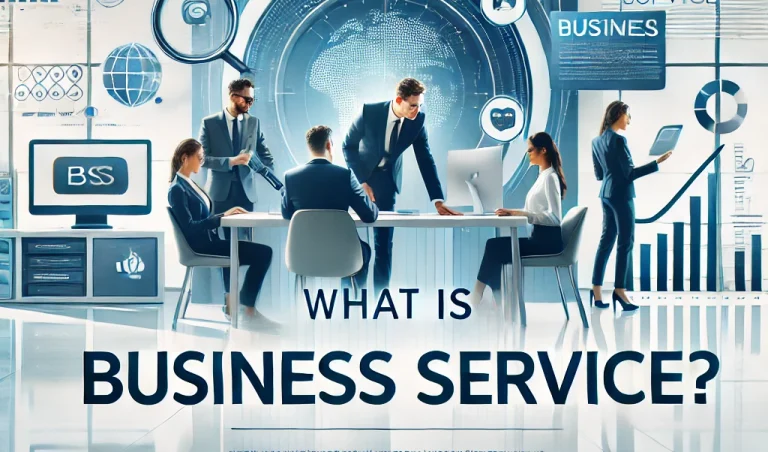Business services are an important concept in the fast-moving, constantly changing world of commerce. What is business services? A short way of putting it is the aggregate of intangible activities that enable an organization to operate efficiently and smoothly. The distinction here is that, unlike a product, which involves the production of tangible goods, business services relate to providing expertise, advice, and technical support, among others, that would enable businesses to run without necessarily having to produce tangible items. Business services mainly provide value by helping an organization become more efficient operationally, save money, manage risks, and generally provide significant operational support to the organization’s internal and external stakeholders.
What Are Business Services?
Business services are broad in their definition and can be anything in the form of non-physical support or expertise that a business requires to operate efficiently. It ranges from basic administrative support to highly specialized consultancy in finance, technology, and strategy. What makes business services essential is that they focus on improving productivity, optimizing processes, managing risks, and providing solutions to problems that organizations may encounter during their day-to-day operations.
Another crucial feature of business services is the non-resulting in ownership rights to any tangible product, while their value lies only in the intangible nature that they create for an organization. It contributes directly to the proper performance of a company by eliminating spaces available from technology, human resources, compliance from lawyers, logistics, and the sales process.
Characteristics of Business Services
Whether it’s managing finances, marketing products, or streamlining operations, business services help companies stay competitive and innovative in a constantly changing environment. Business services have several key characteristics that differentiate them from products or physical goods.
- Intangibility: Business services cannot be touched or seen as other products are, which makes them intangible. They cannot be owned or stored, and this is difficult to measure their value.
- Inseparability: Business services are often inseparable from the people or systems that provide them. Unlike goods, which can be produced, stored, and sold at a later time, business services are generally created and consumed simultaneously.
- Customization: Among the most important characteristics of business services is their potential to be customized to exactly suit the needs of a customer. Services such as marketing strategy or IT solutions are often customized according to a particular business’s specific requirements. This customization makes business services highly valuable since they can directly address a company’s unique challenges.
- Perishability: Business services are perishable. This implies that services cannot be stored, saved, or inventoried for later use. If a customer support agent is not available during peak hours, that opportunity cannot be recaptured.
- Customer Interaction: Customer contact is often an interactive involvement between the service company and the customer. Such active participation is an important source that determines the outcome of the delivered service since it either meets the expectations or not through their satisfaction and efficiency.

Types of Business Services
Business services come in many forms, each meant to fill a specific gap within an organization. Some are quite general and widely applicable, like human resource management, while others are highly specialized, such as financial advisory or technology consulting. This diversity in business services enables companies to tap into external expertise to streamline their operations, gain competitive advantages, and improve efficiency.
Professional Services
Professional services are the specialized services offered by professionals or firms with expert knowledge in a specific field. These services include legal advisory, accounting, consulting, and other high-skill industries. For instance, law firms offer legal advice, accounting firms assist in tax planning, audits, and financial reporting for businesses.
Financial Services
These are important services in any organization, as they facilitate the management of finance, investments, and risks. Services included are banking, insurance, investment advisory, and asset management services, among others. Financial services help businesses access capital, protect their assets, and grow for the long term. For example, one might partner with an investment bank if a firm is raising capital with shares or bonds or using insurers to guard against business loss or liabilities.
Information Technology Services
Information technology services in today’s modern business world have become integral and integral parts of the business environment. It can range from IT support, complex technological infrastructure, software development, cloud computing, and cybersecurity. Such services help businesses to optimize the way they operate, increase revenue by cutting costs, and secure data. For instance, with cloud-based solutions, companies can store and retrieve information from any location allowing for more flexible and scalable operations.
Logistics and Supply Chain Services
Logistics is the backbone of the supply chain and encompasses activities such as transportation, warehousing, inventory management, and distribution. Businesses heavily depend on logistics services to ensure that their products are delivered on time and that the inventory is well managed. For example, an e-commerce company relies on logistics companies to manage the shipping and delivery of orders to customers, providing timely and cost-effective services.
Human Resources (HR) Services
HR services are helpful for businesses because of the management of human resources, beginning with recruiting, and hiring to payroll management and staff training. In addition to maintaining compliance with labor laws and maximizing talent usage, HR service ensures sustained employee satisfaction. More often than recruitment, these services include benefits administration, performance review, and workforce development.
Marketing and Advertising Services
Marketing services are essential for advertising products, brands, and services. These services include digital marketing, social media management, content creation, branding, and market research. Businesses use marketing and advertising services to reach target audiences, build brand awareness, and drive sales. Marketing firms often provide creative strategies, data analysis, and media buying to help businesses communicate effectively with customers and generate demand.
The Role of Business Services in Different Industries
The value of business services is universal across all industries, though the manner of application can be drastically different. Every sector depends on these services to drive growth, streamline operations, and maintain a competitive advantage. Companies without business services would struggle to cope with the complex demands of the modern market.
- Healthcare: Business services for various healthcare organizations ensure the success of operations. The most significant advantage of IT services lies in managing patient records. Meanwhile, financial services will take care of budgeting and insurance claims. Human resources service helps with recruitment and management of employees.
- Manufacturing: During manufacturing, business services including supply chain management and logistics are essential for optimizing manufacturing costs and reducing costs at all levels. Financial services aid in managing production budgets and ensuring profitability.
- Retail: The various services the retail business employs can upgrade the experience for its customers and make its operations efficient. Marketing services help brands endorse themselves to customers, whereas logistic services help in maintaining a safe inventory and delivering products as needed by customers. HR services will include hiring and training, whereas financial services are necessary for financial planning and managing cash inflow.
- Technology: Business services that are very important in the technology sector include IT consulting, marketing, and human resources. Technology companies depend on IT services for the development of their products and innovation. Moreover, they require specialized HR services to recruit skilled employees and develop talent. Marketing services help reach potential customers and promote their products in competitive markets.
Business Services Challenges and Considerations
While great value is promised by business services, several challenges need to be taken seriously in using these services. Therefore, understanding the challenges will be central to maximizing the benefits of business services while minimizing the risks.
- Cost Management: One of the main challenges of using business services is cost management. Outsourcing may reduce overheads, but at the same time, it can also create hidden costs, especially if the service provider does not deliver as expected. Businesses need to determine if the service is worth the cost and look for ways to optimize service contracts.
- Technological Adaptation: In the modern digital world, businesses have to keep adjusting to new technologies. For instance, IT services require companies to invest in the latest systems and software to remain competitive. However, these investments can be quite costly, and businesses need to weigh the long-term benefits of such services.
- Service Quality: One of the major concerns for businesses that rely on external providers is ensuring consistent service quality. Whether it is marketing services or financial consultancy, businesses have to monitor service quality to ensure they get value for their money. Service providers must continually improve their offerings to meet changing client needs.
- Regulatory Compliance: Industries such as healthcare, finance, and manufacturing require regulatory compliance. Business service providers should be knowledgeable about the applicable laws and regulations, and businesses should ensure that their providers comply with these requirements. Otherwise, they will face legal and financial consequences.
Business Services FAQs
What is the role of business services in enhancing productivity?
Business services streamline operations, reduce overheads, and offer specialized expertise, allowing businesses to focus on their core activities. This leads to improved efficiency and productivity.
How do marketing services contribute to business growth?
Marketing services help businesses reach and engage their target audience, build brand awareness, and increase sales through strategies like advertising, content creation, and social media marketing.
What are the challenges of outsourcing business services?
Outsourcing business services can lead to cost overruns, quality control issues, and communication gaps. Businesses must carefully choose service providers and monitor their performance.
Why are IT services critical for modern businesses?
IT services enable businesses to automate processes, store and secure data, and stay competitive in a digital-first world. They also allow businesses to integrate new technologies for improved operations.
What makes financial services essential for business decision-making?
Financial services help businesses manage capital, forecast cash flow, and make informed investment decisions. They ensure that businesses remain financially sound and compliant with regulations.


